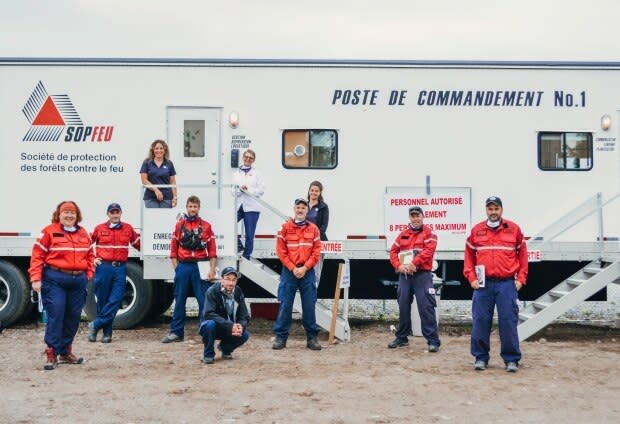Worst year in a decade for forest fires in Quebec and COVID-19 is partly to blame, say firefighters
Quebec's hot summer so far, with long stretches of little rain, has contributed to a large increase in the number of forest fires around the province.
It is only early July but 2020 is already the worst year in a decade in terms of hectares lost to forest fire in Quebec.
Since January, nearly 61,300 hectares of forest have been destroyed by fire in what's known as Quebec's "intensive zone," roughly the area south of Chibougamou, Que.
The average for this time of year is 33,600 hectares of forest lost to fire, according to Quebec's forest fire prevention organization SOPFEU.
Quebec's intensive zone hasn't lost more than 60,000 hectares to forest fire in a whole year since 2010, when around about 223,358 hectares was burned.

As of Sunday, there had been 537 fires in the intensive zone — more than double the average figure.
The bulk of the damage has been caused by a fire in Chute-des-Passes, just north of the Saguenay–Lac-Saint-Jean region.
SOPFEU believes a campfire started the forest fire on June 16. The fire eventually spread to more than 59,936 hectares — a surface area larger than the entire Island of Montreal.
More than 300 firefighters and support crew, some from Ontario and Alberta, are still fighting the blaze, 19 days later.
Pandemic has contributed to forest fires, SOPFEU says
Yan Boulanger, a research scientist in forest ecology at Natural Resources Canada, said his agency had predicted that weather conditions would leave the province with a particularly harsh forest-fire season.
"All the conditions were there to create fire-conducive weather," Boulanger said in a recent interview.
"It was very dry, very warm, so if there was some ignition, the fire could spread very, very rapidly."
The ignition usually comes from humans. As many as 90 per cent of the fires this year have been caused by human-activity, said SOPFEU spokesperson Cathy Elliot Morneau.

Morneau said the COVID-19 pandemic has also contributed to this year's destructive forest-fire season.
Many people self-isolated in their cabins and secondary homes, following public-health guidelines. Some took the opportunity to clean up and opted to burn their waste.
"They cleaned their garage. They cleaned their lawn. They burned leaves a lot.… And then [the fire] went, for some of them, in the forest. So it burned some of the forest," Morneau said.
"The spring was really dry too so it was a hard combo for us."
Once a forest is destroyed by a fire, it can take up to 30 years for it to completely regenerate, Boulanger said. If a fire produces enough smoke, it can also have an impact on the air quality across the province.
Situation likely to worsen in future
In part because of climate change, Natural Resources Canada estimates that forest fires will continue to get worse in Quebec and across the country over the next several years.
"We tried to see how communities might be affected by the fire currently and into the future. We saw that First Nations communities are the ones most exposed to very frequent fires within Canada," Boulanger added.

In Quebec, he said Indigenous communities in Northern Quebec, and especially the James Bay Cree community of Chisasibi, Que., may be hit particularly hard because of their geographic location.
"They are within an ecosystem that is burning quite frequently.... [Forest] fire will be much more prevalent in the future," said Boulanger.
"These people would be much more affected proportionally than other kinds of communities that are in Canada."
While it may look like communities near forested areas are reliant on nature's mercy, Boulanger said the increase in forest fires is not necessarily inevitable.
"If we emit less greenhouse gas emissions for example, the amount of fire, the quality of fire, the number of fires and the area burned would be much less than if we do business as usual," he said.


